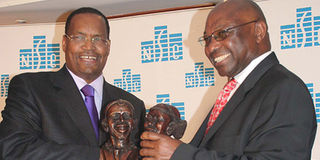Fraud: Markets Authority ignored own advice

Jimnah Mbaru (right) and James Wangunyu, who run brokerage firms, are said to have been lenient to fraudsters. Photo/File
About two years ago, Ms Renee Blasky, a respected market analyst, released a report calling for radical changes in the stockbrokerage business in Kenya. Some of her proposals would have averted the collapse of Nyaga Stockbrokers and Discount Securities and saved investors from huge losses.
But the Capital Market Authority (CMA), the market regulator that hired her to craft recommendations on how best to reform the capital markets, ignored the report. Ms Blasky, who is the managing director of Vista Capital Ltd, had, among others, called for dismantling of the current system where stockbrokers control virtually everything at the Nairobi Stock Exchange — from setting trading rules to who gets admitted the bourse.
“People were unhappy that there is an ‘old-boys’ network among stockbrokers that seem to encourage collusion and inhibit competition,” she noted. Ms Blasky called on the regulator to open up the stock market to competition by licensing more stockbrokers and allowing foreign companies to partner with local brokers but cap foreigners’ equity holding to 49 per cent.
But then CMA chief executive Edward Ntalami, who was to be replaced by Stellah Kilonzo, poured cold water on her recommendations.
“Just because the consultant has made recommendations does not mean we shall adopt them,” Mr Ntalami said. The authority, he added, needed to subject the recommendations to “a very rigorous review from the market.” Those recommendations now find vindication in a forensic audit on Nyaga Stockbrokers by audit firm PricewaterhouseCoopers (PwC).
In the damming report, the auditors cite collusion by stockbrokers and inaction by the regulator as the key catalysts of fraud that might cost investors in Nyaga Stockbrokers about Sh1.3 billion.
“Had the NSE board taken action against Nyaga instead of facilitating the continuation of its operations in various ways, the losses to investors might have been less,” says the PwC report, which reveals an elaborate and extensive cover-up of operations between the NSE and CMA.
What has confounded many is the revelation that companies owned by then NSE chairman, Jimnah Mbaru, and his then vice-chairman, James Wangunyu (who is now chairman) facilitated the fraud. In line with “peer review”, they ought to have initiated an audit of Nyaga Stockbrokers management but chose to look the other way until it was too late.
The two also failed to take action against Mr Patrick Gakiavih, the proprietor of Nyaga Stockbrokers, from the NSE boardroom where he remained as a director.
“Two of the board members (Mr Mbaru and Mr Wangunyu) were either aware or should have been aware, on the basis of client complains and compliance records, that Nyaga was using client funds for its purpose in breach of fiduciary duties to its clients,” PwC reports.
The audit firm further notes that the two companies — Mr Mbaru’s Dyer & Blair Investment Bank and Mr Wangunyu’s Standard Investment Bank — pocketed more than Sh382 million just a few months before Nyaga Stockbroker collapsed. The two have defended these transactions, however, saying the money was part of “over night lending” to Nyaga meant to ease its liquidity problems.
The forensic audit, seen by Smart Company, questioned Mr Mbaru’s and Mr Wangunyu’s motives in the NSE board’s approval of Sh100 million cash injection to Nyaga Stockbrokers a month before it went down.
The two, the PwC reports says, benefited from “the rescue package” with Mr Wangunyu’s Standard Investment Bank taking Sh12 million while Dyer & Blair took only 500,000 after its attempt to secure Sh25 million hit a snag.
“We loaned out to Nyaga Stockbrokers Sh25 million for which we received post-dated cheques of the same amount…,” Mbaru was quoted as saying by our sister publication, the Business Daily.
But in a pronouncement that could give an indication of the contempt that stockbrokers are viewing the damming report, Mr Wangunyu, speaking as NSE chairman last week, dismissed the investigations by PwC as “naive and shallow.” “They do not understand the working of the stock market,” he told a local television station.
But the weighty nature of PwC recommendations is better seen in line with government and regulator actions. Treasury, which has also been accused of abetting the crime, failed to issue a press release on the matter after promising to do so, arguing it would jeopardise the defence available to those accused.
The regulator, while admitting seeing the report, was more direct. “CMA appreciates the public interest in the report,” it said in a statement, “but would like to clarify that it is premature to comment on the report at this stage since the recommendations have far reaching implications and wide consultation is necessary before implementation.”




